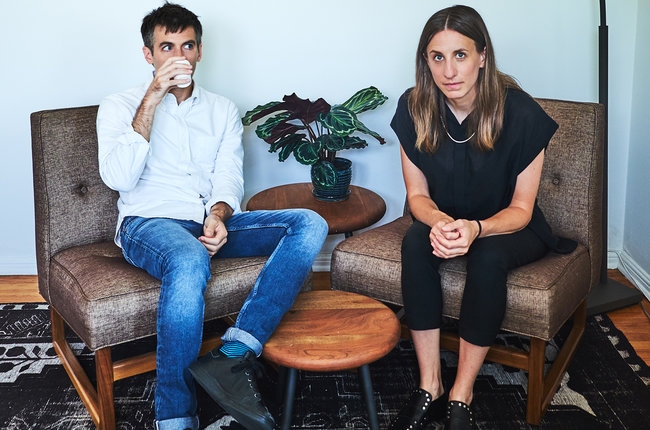Spend a day with a songwriter or producer and you'll see the music industry has an organizational problem -- namely, how does one keep track of all their tracks? Sick of sorting through personal hard drives, Dropbox folders and SoundCloud links, Godmode Music co-founders Nick Sylvester and Talya Elitzer set about developing a solution shortly after relocating to Los Angeles last year .
After six months of development, the two came up with Bounce, a web-based workflow app built around the specific needs of the music industry, helping to organize material project-by-project and build comprehensive playlists of every different version of a song that exists, from inception to completion, accessible by invitation only. The functionality is intuitive: drag and drop tracks to upload; organize new versions (while keeping the old ones) under a single name; sort by tags or titles; and share privately without fear the song might accidentally publish (the site was not designed to be public-facing, like SoundCloud). Commenting and basic search functions exist as well in a Bounce beta version that was released Tuesday (July 25) to those who request an invitation. Future updates should bring more detailed capabilities, such as A-B testing between different tracks.
Bounce was born out of the necessity of organized project management for its creative team, who pride themselves on bringing way-left artists "slightly more to the center," and "way-center artists" a bit more to the left. For Godmode, such acts have included Shamir and DJ/producer Yaeji, whose debut EP came out this past spring. Meanwhile, individually, Sylvester has worked with Brodinski, MNEK, Sleigh Bells and LCD Soundsystem -- the latter on their "final" shows in 2011 at Madison Square Garden (James Murphy taught him how to record and program synths) -- while Elitzer used to work as a booking agent at William Morris Endeavor and in A&R at Capitol Records. And though the two insist improving workflow is the principal intent behind their self-funded dip into tech, it's also easy to imagine where this could lead conceptually.
Using Kanye West's latest album, The Life of Pablo, and its unusual rollout as an example, the duo tell Billboard this could be the beginning of a new way of releasing music, where artists share many versions of a track and turn a "recording into a performance," as Sylvester puts it, with the result that a song may never actually be "finished" by the standard definition.
Ahead of the app's beta launch, Billboard spoke with Sylvester and Elitzer about their new project and how identifying a problem at 3 a.m. in the studio could someday change the way we hear music forever -- or at least help the business run a little smoother.
Billboard: How did you come up with the concept for Bounce?
Sylvester: We just found ourselves bombarded with songs and demos in all forms, having to give notes on all these things, having revisions. Sometimes you like the version from, like, two or six before... I've been in A&R meetings where it's just like, "Give me five minutes, I have to find the right version." We just felt really goofy that we didn't have a way to deal with this. There are really complicated ways of dealing with it, but we needed kind of the dumb, idiot music industry way of dealing with it. And it was just for ourselves as an internal tool, so that we can do our jobs better. So we hired a couple developers and developed something over the last six months, and that [became] Bounce. And "Bounce," of course, is [the term for] when you [export] a song at the end of the session.
So, very fundamentally, Bounce is to help musicians and people who work with them stay organized?
Elitzer: For every song there are a lot of people that have to give their notes, whether it's internally within a band, whether it's the artist, the producer, the manager, A&R person, publisher, and it just gets very complicated. There's this flood of emails and Dropbox links and stuff that becomes very hard to keep track of. And then, inevitably, being on the more business side of it, it was like, "Oh, f--k. I lost this version that I loved so much. Where is it?"
Sylvester: Right, because it has a different name, like maybe it was originally called "Steel Drum Song" and then it becomes "Song for Jamie xx," you know what I mean? So everybody has their own versions of dealing with this: "Here's the link to the SoundCloud demo, private link, here are my notes..." And then the next version is sent. We got sick of it.
Elitzer: A friend of mine who doesn't work in music said to me recently, "What programs and what software do people in music use?" I was like, "What do you mean?" The producers and artists use Logic and Pro Tools and that's really streamlined, and obviously there are things like Spotify and iTunes and all the DSPs. But there are no workflow apps.
Sylvester: There are so many great music-making tools right now and it's never been an easier time to be a music consumer. Both extremes are pretty well-catered-to. But just the very simple thing of keeping your demo separate from your finished music library is very complicated. And it's not like I'm thinking about it when it's 3 a.m. and I'm so tired I want to get home to my wife and my dog. I just want to be able to drop a file into a window and click share and know that it's gonna be fine and whoever needs to hear it will hear it.
So it's as much about organizing as it is privately sharing music, and the core issue is doing both of those easily?
Sylvester: Right. And the reason I had mentioned SoundCloud earlier was because that was an early way of getting and giving notes.
Elitzer: But it's a really bad idea because it's insecure, or one wrong click and then it's a public link.
Sylvester: And also, the way a lot of modern music uses samples, a lot of times what would happen is you would finish a demo, put it on SoundCloud and then SoundCloud would snatch it dowb because it detected the sample.
Elitzer: SoundCloud wasn't meant for that, it was meant for its public facing [service].
Sylvester: We don't think of Bounce, like, "the new SoundCloud," but we do know that people use SoundCloud for Bounce-like applications. So we just kind of hustled over the last couple weeks to get it into some sort of Beta form, to just let other musicians and artists and producers try it and kind of just start from there.
Elitzer: We made something that works how music people work. It's not some crazy enormous program that you have to download, or any sort of complicated thing. We put it in our language, we used it how music people actually use it and we just thought it would be and useful for other people. This is still a very early stage.
That's the first step. Do you have a vision for where Bounce goes from here?
Sylvester: I think a lot of the people that are in our world also just like the story of seeing how a song comes into existence. So with Kanye West and The Life of Pablo, for instance, one thing that happened was he kept changing the songs, changing the recordings, and he was kind of doing it on the low. Maybe he would say, "I fixed the verse on this." But it was all released and he would basically have the tracks pulled from all the DSPs and then he would put up the new one.
But what if you liked some of the earlier versions more?
Sylvester: Exactly. And I had that similar experience with Weezer's Green Album. I was in college and some unmastered mixes were released and I really, really, really liked the unmastered versions a lot more. One of the things about Bounce that I think is really fascinating is this idea of turning a recording into a performance. 'Cause a recording is typically understood as the dead zone of a song; that's the endpoint.
Elitzer: You delivered the music and the process is over.
Sylvester: But what Kanye did was, in a way, he opened up this idea of, What if recordings were performances, too? And what if you could go back to early performances? What if you could hear the voice memo of Selena Gomez walking down the street, singing a thing, or the songwriter who worked on the song singing it, and that was all part of [the release]? What value would that bring to music and how would that change how people relate to it?
Elitzer: The landscape's already been changed because of Kanye, and it's interesting to think about all the larger ideas and implications of that and how music is consumed.
Sylvester: Right now in this playlist culture, music is the mistress to lifestyle: "Here's music to chill out to on a Friday night, here's music to turn up on a Saturday night, here's music to study, here's music to chill." The culture right now is that music is not the main course, it's auxiliary. But I like this idea of bringing value to music as a thing worth deep-diving into and trying to create context around music, artists and the process. I think it just changes how you interact with music.
Are you thinking that artists might one day release music via Bounce, or is it mostly to collect the works and then they might share with DSPs or however they like?
Elitzer: For now, it's more inward-facing and more of a task-management type of thing.
Sylvester: It's for people who are doing this every day, doing what we're doing every day. But those are the bigger ideas. It's all interesting, but the most important thing is that it needs to just work for producers and songwriters at three in the morning.
How do you balance this new tech project with running a music company?
Elitzer: As a manager, I help run and strategize around all the different artists and producers and writers, businesses that I look after -- that's how my brain has to work. And this, it's sort of operating as a new artist.
Sylvester: Which is to say, you don't buy a billboard for your new artist until people give a sh-t about the new artist. And so I think that thinking about a piece of tech in the same way that you think of an artist is healthy for expectations reasons. Like, you don't expect the app to get on the New Music Friday playlist of apps [right away], you know? You have to grow it and you have to develop it and you have to make it better and you have to be patient.
Elitzer: The problems are very different than you would have as a starving new artist, but it's still the same concept of, "Oh, we have to work out these kinks. We have to figure out, how do we scale to get to this point?"
Do you have any concerns about larger tech companies seeing this and making their own version?
Elitzer: I mean, they could, but they don't know how music people work. That's the reason why this hasn't happened already: there hasn't been anyone who speaks our language and who understands our workflow -- "our" meaning the music industry -- to make something that makes sense to use and that works that uses our language.
Sylvester: Ultimately, it's a sensibility and it's a feel and it's a kind of insider information that you don't get unless you're doing this every day.








